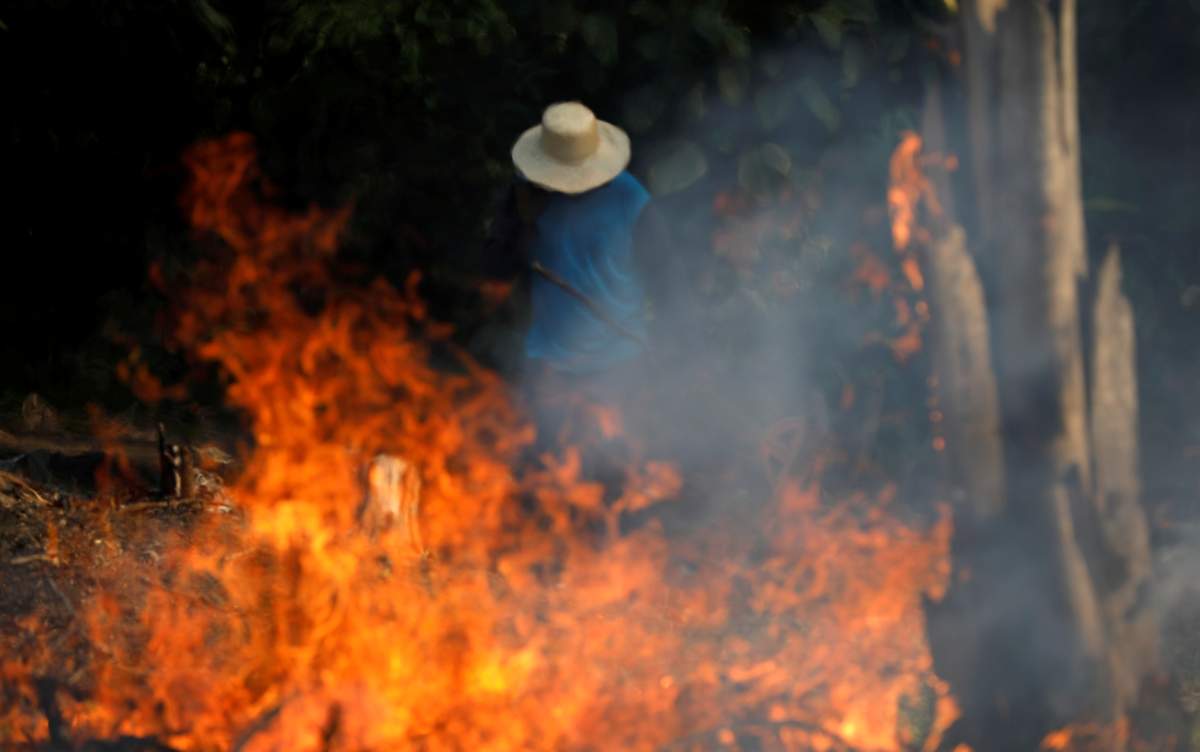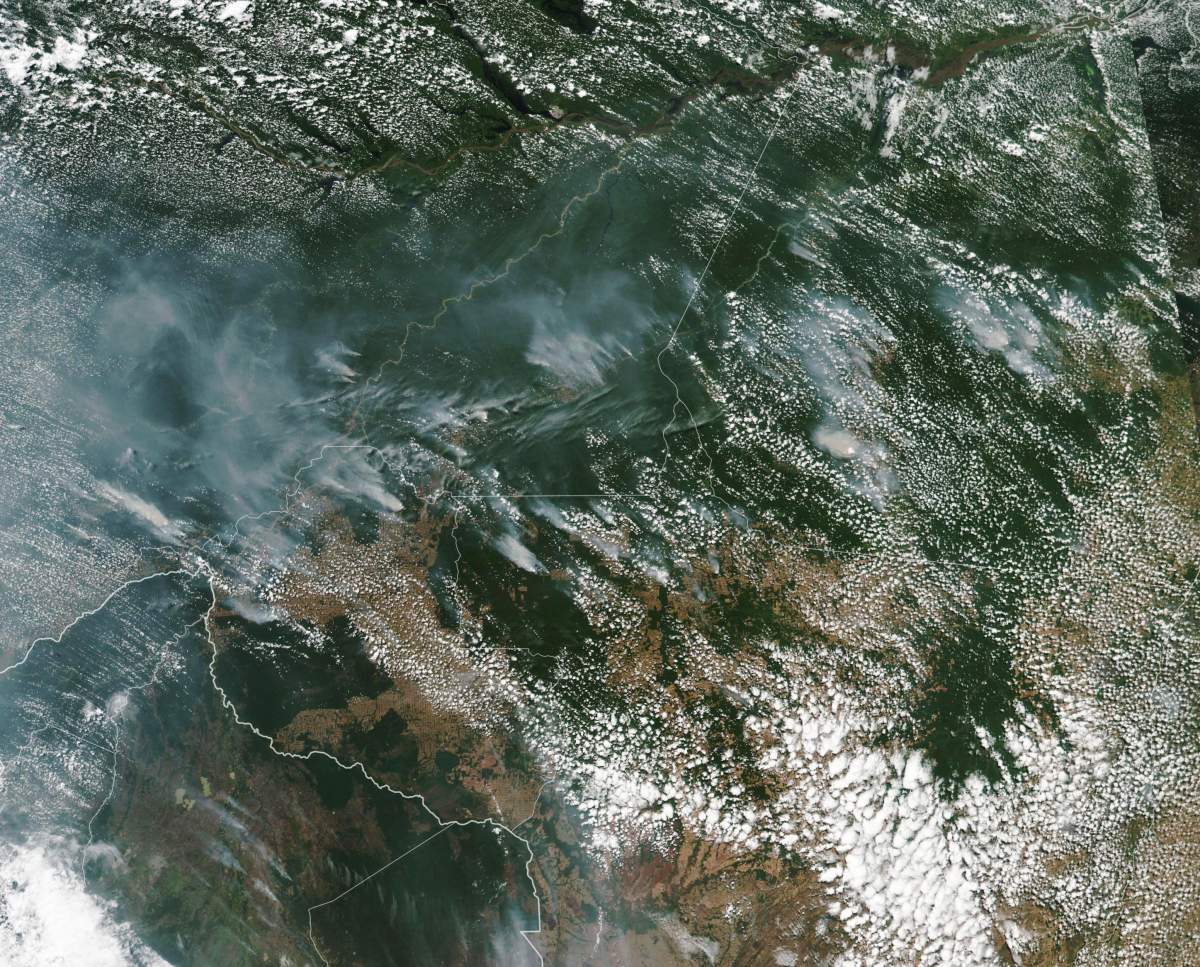The Amazon rainforest, the vessel holding a massive amount of the world’s oxygen, is burning at a rate scientists have never seen before.

The National Institute for Space Research (INPE) has recorded more than 74,000 fires so far this year – an 84 per cent increase on the same period in 2018. It’s the highest number since records began in 2013.
In comparison, 40,136 fires burned in the region last year. The second-worst year was 2016, with 68,484 fires.
The Amazon is regarded as vital in the fight against global warming due to its ability to absorb carbon from the air. It’s often referred to as the “lungs of the Earth,” as more than 20 per cent of the world’s oxygen is produced there.

Brazil has the biggest share of the 670 million hectares of forest (60 per cent), which is home to more species than anywhere else on the planet.
But unlike in other ecosystems, scientists say the wildfires burning in the Amazon are not natural.
Deforestation is considered the major contributing factor behind the alarming numbers.
Environmentalists have also put the blame on President Jair Bolsonaro, saying his policies have only threatened the forest more.
WATCH: Dramatic video captures wildfire burning in Brazil’s Amazon Rainforest

Bolsonaro has suggested that the data showing the increase in wildfires isn’t accurate — even going as far as to blame NGOs without evidence for starting fires. He said his government is working to control the fires, but it’s not clear what measures the administration is taking.
“I am waiting for the next set of numbers, that will not be made up numbers,” he said. “If they are alarming, I will take notice of them in front of you.”

Get breaking National news
What is causing the fires?
While wildfires in the Amazon are not entirely uncommon, the way they are spreading is driving concern.
The Amazon rainforest has been “fire-resistant” for much of its history because of its natural environment, according to the National Oceanic and Atmospheric Administration, but can go through hot spells.
WATCH: What is causing the Amazon rainforest wildfires?

While drought can be a factor in rainforest fires, INPE researchers have said there is nothing abnormal about the climate or rainfall amounts in the Amazon this year.
“The dry season creates the favourable conditions for the use and spread of fire, but starting a fire is the work of humans, either deliberately or by accident,” INPE research Alberto Setzer told Reuters.
Human activities — farming, mining and drilling — are what scientists say are exacerbating the situation now.
WATCH: Deforestation in Brazil’s Amazon rainforest exceeds 88% in June

In Brazil, cattle farmers start fires deliberately to clear forest to make way for ranching, and it’s not always legal.
In Mato Grosso and Para, where Brazil’s agricultural frontier has expanded and pushed into the forest basin, more deforestation has been recorded and wildfires have increased.
The World Wildlife Fund estimates that more than a quarter of the Amazon will be without trees by 2030 if the current rate of deforestation continues.
The fears surrounding deforestation have grown under Bolsonaro, who has vowed to develop the region for farming and mining since coming into office, ignoring international concern over deforestation and climate change.
Data from INPE suggests that since he took power in January, deforestation numbers have soared.
Why is the president being criticized?
Brazil’s far-right president has long been accused of neglecting the global climate change fight and endangering the rainforest.
Bolsonaro, a former army captain, campaigned on a pro-business stance.
He rolled into office on Jan. 1 with a number of promises, including to restore the country’s economy by finding other uses for the Amazon forest. During his campaign, he vowed that if elected he would not set aside a single “centimetre” more land for Indigenous reserves.
Within hours of taking office, he implemented a number of law changes that would benefit Brazil’s pro-development “rural caucus.”
Carlos Rittl of the Observatorio do Clima (Climate Observatory) told CNN that environmentalists and researchers blame Bolsonaro’s pro-business leadership for emboldening farmers to cut away at more Amazon land for ranching.
“Over the past six months, Bolsonaro and his environment minister have been devoting themselves to the dismantling of the Brazilian environment governance and neutralizing regulatory bodies,” Rittl said.
Recently, the research agency INPE presented data that showed an 88 per cent increase in deforestation in June compared to the same month one year ago.
Bolsonaro responded by attacking the data from INPE, calling the findings “lies” that hinder trade talks for Brazil.
WATCH: Stunning images are coming out of the Brazil as a massive wildfire rips through parts of the Amazon. And many are blaming the president of Brazil for the fires.

He later fired the head of the agency, director Ricardo Galvao, claiming the research is inaccurate and that it was hurting Brazil’s reputation.
Galvao told Reuters that the figures showing a spike in deforestation are “undeniable.”
What has the response been?
Other countries working to fight climate change have started to take notice. Norway and Germany have pulled out of funding for projects to quell deforestation in Brazil.
Environmental groups have also not shied away from firing back at Bolsonaro.
Greenpeace called the president and his government a “threat to the climate equilibrium” and warned that Brazil would shoulder a “heavy cost” to its economy under his policies.
WATCH: Sao Paulo plunged into darkness as Amazon wildfire burns

Bolsonaro has mostly rebuffed the criticism.
He’s suggested that the spread of fires was merely the typical time of year for “queimada,” or burn, when farmers usually clear land.
“I used to be called Captain Chainsaw,” he said. “Now I am Nero, setting the Amazon aflame. But it is the season of the queimada.”
Recently, without presenting evidence, he claimed that non-government organizations could be burning down the rainforest to bring shame to his government.
He said “everything indicates” that NGOs are responsible but had no evidence for his allegations, saying he doesn’t have a “plan” because “that’s not how it’s done.”
— With files from Reuters and the Associated Press










Comments